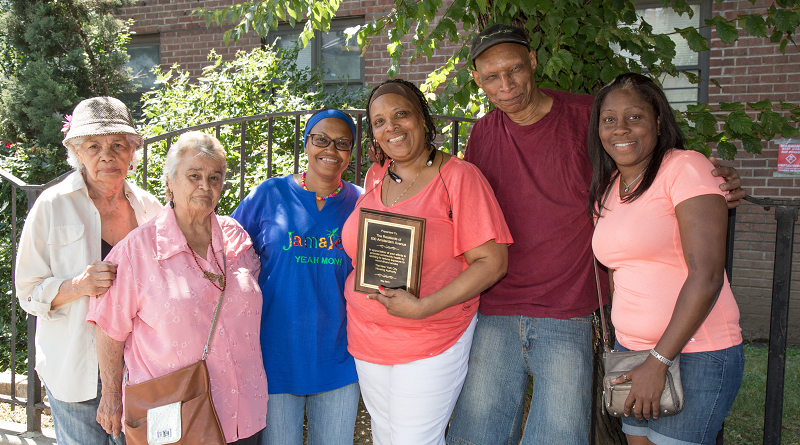Smoke Free at 830 Amsterdam
Residents of 830 Amsterdam in Manhattan have taken a stand for the health of their families and neighbors by taking a voluntary pledge to maintain a smoke-free environment.
On May 19, NYCHA staff and partners came together to celebrate the residents as the first NYCHA building on its way towards eliminating secondhand smoke which can cause heart attacks, strokes, and lung cancer, and worsen asthma symptoms. Residents of 830 Amsterdam were proud of being the first NYCHA building to overwhelmingly sign on to a voluntary smoke-free pledge.
Going smoke free means that residents who signed the pledge will not allow smoking in their apartments. It does not mean that smokers can’t live in the building or visit residents, but as Andrea Mata, NYCHA’s Senior Manager for Community Health Initiatives, explains it: “It means that indoor air is cleaner because residents who smoke do so outside of the building where it will not impact the health of family members and neighbors.” Eighty-five percent of households in the building have signed the smoke-free pledge, including nine floors where all residents have taken the pledge.
Smoke-free housing is a growing trend, with many buildings across the city and country adopting rules to reduce exposure to secondhand smoke, and has wide spread support by HUD, American Lung Association, American Academy of Pediatrics, and more.
At the celebration, many residents were inspired to share how important they felt going smoke free for their community and how smoking has affected their lives, including a man whose smoking worsened his heart condition and woman who lost her sister to emphysema. Many NYCHA residents suffer from high asthma rates and other diseases such as diabetes, heart disease, and cancers that are impacted by smoking and exposure to secondhand smoke.
“What we’re trying to do at 830 Amsterdam is become a family who really cares about where they live, who cares about their children, who cares about the air. We want to be that model building who knows that there are certain things that are not healthy for us,” Resident Association President Shirley Williams said at the event. Ms. Williams was presented with a plaque that commended residents on their efforts to “promote community health by working to reduce exposure to secondhand smoke.”
In addition to residents of Douglass, many people came out to recognize the groundbreaking achievements of 830 Amsterdam residents including Roger Hayes, Assistant Commissioner of the NYC Department of Health & Mental Hygiene (DOHMH) and Dr. Maida Galvez, New York City Chapter President of the American Academy of Pediatrics, who emphasized that secondhand smoke is especially dangerous for children. 830 Amsterdam resident Atiyya Muhammad spoke on behalf of the younger generation, telling her neighbors that even though she doesn’t smoke being around resident smokers is like picking up the habit.
Roger Hayes from the DOHMH talked about how going smoke-free can be the first step in helping smokers quit: “One of the things that helps people break the habit is having all these hassles of trying to find a place you can smoke and if you can’t smoke here and you can’t smoke there pretty soon it becomes easier for you to quit.”
Dr. Maida Galvez told residents that they accomplished something phenomenal: “When people ask me what’s at the top of my list for environmental concerns, a safe and healthy home environment and smoke-free housing is at the top of the list. This will go a long way to ensuring the healthy development of children’s lungs and reducing the risk of asthma not only for today’s generation but for the next generation as well.”
Also present at the celebration was Ajamu Brown, who worked with residents at 830 Amsterdam and other developments across NYCHA to promote health by reducing exposure to secondhand smoke and increasing resident access to resources for smokers who want to quit. This work was inspired by a citywide survey of NYCHA residents in 2012 that found over half of respondents reported smelling cigarette smoke in their home that came from another apartment or outside. The survey found nearly three-quarters of all respondents think some NYCHA developments should be smoke-free.
“What you’re doing can affect lives, you’ve seen residents in this building who have health issues and this is now a place that they can actually come back to and breathe,” Brown said. “NYCHA is the largest public housing authority in the country, what you guys are doing people can do in smaller public housing authorities in other states, what you are doing can have a ripple effect on other places.”
William DeVoue, a Douglass resident who served as a Community Health Leader helping to lead the communitybased research at 830 Amsterdam and has presented on smoking and health and smoke-free housing at a number of community events, said, “If you have two smokers on your floor and you’ve been on your floor for 10 years, then you have 10 years of accumulation in your house, on your walls, on your pictures, on your fridge on your door. So when it’s put like that, you have to say to yourself, I have to do something.” Want to get involved? Residents interested in bringing outreach and education on smoking and health to their development can call 212-306-8299 or email partnerships@nyc.nyc.gov.
Are you a resident who smokes and wants to quit? Learn more about available resources by calling 311 or texting NYC QUITS to 877-877. Information is also available online at nyc.gov/nycquits.

